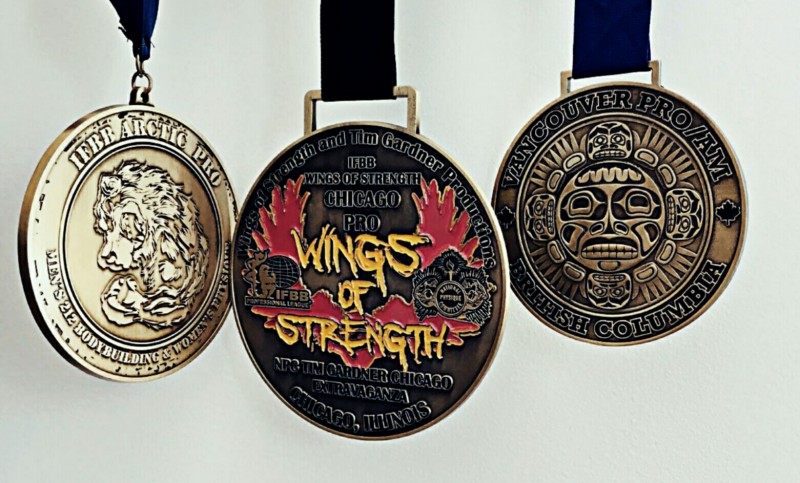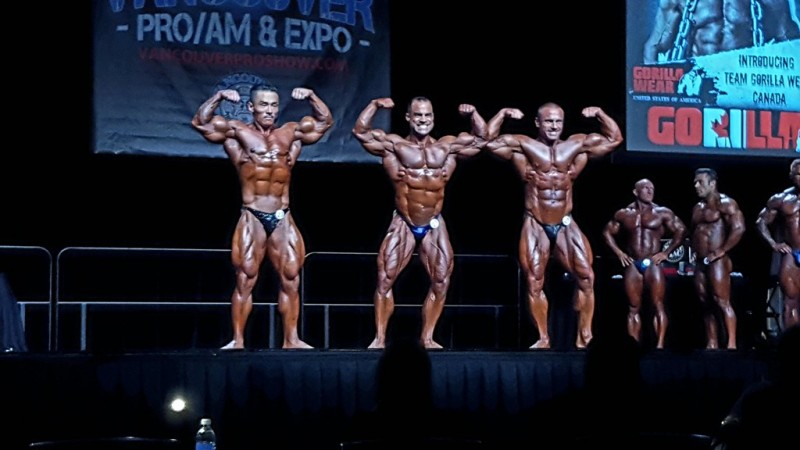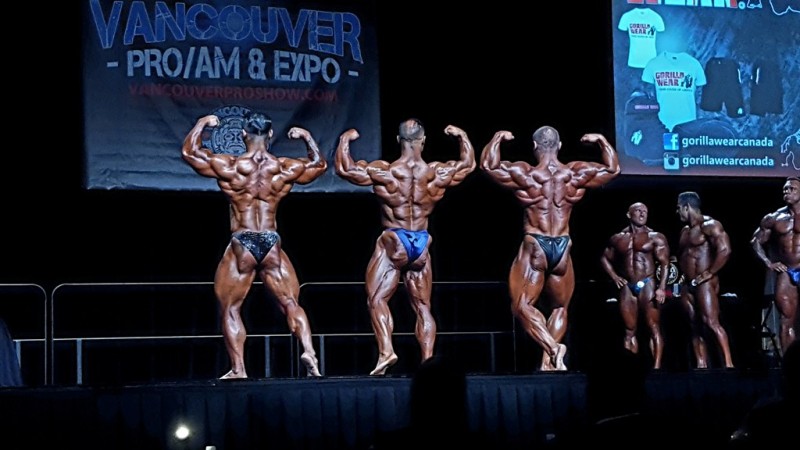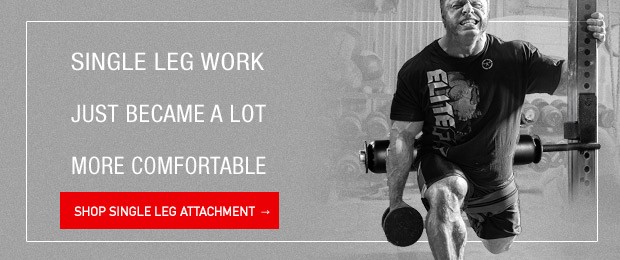
The emails and private messages invariably begin rolling in post-contest. This time is no different, aside from perhaps the overall increase in volume. I guess that’s to be expected when you qualify for the Olympia via three professional wins in four weeks, which capped off roughly 12 years and a total of 32 IFBB competitions at 41 years of age. Hence, the three-peat: Arctic Pro 212/Chicago Pro 212/Vancouver BC Pro-Am 212 victories. I’m still numb, exceedingly grateful, and numb! In this article, I plan to detail some of the specifics of what I do the final week to ensure I’m stage ready on contest day.
Who Gets Credit
I can’t stand here and tell you with sincerity that 100% of the credit for my recent success belongs to me. A number of people played significant roles and certainly deserve much of the credit. Specifically, John Meadows who programmed most of my workouts, my training partners who helped fuel productive training sessions, and my bride Christina who is the unsung hero most often found in the shadows greasing the wheels of the Dugdale family machine to provide margin for me to focus on work and contest prep. However, at the top of the list of contributors is God.
RECENT: IFBB Arctic Pro 212 — My First Pro Win
No, God didn’t lift the weights, do the cardio, or eat the chicken breasts for me. That said, I firmly believe God uniquely wired and gifted me with a mindset to endure brutal workouts, perseverance to fight through Tabata cardio sessions, discipline to maintain a strict diet, and—perhaps most important—a physical genetic makeup which “pops” on stage when leanness, dryness, and fullness are optimized. So now to the point of a huge preponderance of the questions emailed to me: how did I get so dry and full? Here is a list of critical factors.
Five “Stage Ready” Factors
1. Get your ass in shape.
Final week training, carb, sodium, and water manipulation means nothing if you’ve not already attained contest-ready body composition. Far too many competitors erroneously think there’s a secret because they continually miss their peak. The problem isn’t their last week strategy, but their lack of conditioning. Sure, you look amazing at the beach with your beer drinking bros, but an IFBB pro stage is a whole different level, my friend.
You cannot out work a bad diet, so if you’re doing over an hour of cardio per day, your diet sucks. Be prepared to suffer or take up golf. There’s no shortcut to getting ripped, and diet plays a significant role. As a point of reference, my calories were in the 1,500-1,600 range the last couple weeks.
2. Train to deplete muscle glycogen.
Assuming a Saturday morning prejudging, the goal from Sunday through Thursday includes depleting muscle glycogen via training and carb cutting. In regards to training, I suggest sticking to your normal schedule; however, increase reps to at least 12-15 on all exercises, always stop several reps short of failure, and aim to make the movement eccentric-less. By eccentric-less I mean to de-emphasis the negative portion of the movement as much as possible. Eccentric-focused training can benefit hypertrophy, but is most often followed by extreme soreness. We do not want any soreness going into the competition. Deplete the muscle of glycogen stores; don’t traumatize it.
Here is my specific training split one week out from competition:
- Saturday — Last primary leg workout
- Sunday — Carb depletion begins, back and biceps depletion
- Monday — Chest, shoulders, triceps depletion
- Tuesday — Quads and hamstrings depletion
- Wednesday — Back and biceps depletion
- Thursday — Chest, shoulders and triceps depletion
- Friday AM (Before Carb-Up) — Five minutes of Tabata cardio
Search my training log for the nuts and bolts of depletion workouts, as I’ve posted a few over the last year.
3. Carbohydrate modulation.
Okay, let’s assume you nailed #1. You suffered, did your homework, and your glutes are ripped three weeks out. Now the fun begins the final week because manipulation of carbs, sodium, and water can directly and positively impact your appearance on stage. I personally carb deplete from Sunday through Thursday to make my muscles flat and screaming for muscle glycogen. I flip the switch on Friday morning when I begin to add back carbs. I already diet on low carbs outside of the Biotest Plazma I consume intra-workout, therefore depletion week looks essentially the same besides the fact I substitute 1-2 servings of Mag-10 for my typical pre-contest double serving of Plazma.
Friday morning when I begin carb-loading, my first food source is always a ripe banana. I do this because restoring liver glycogen tends to make the entire carb-up process more effective. A ripe banana contains fructose which is preferentially used to restore liver glycogen. After that, it’s three meals of brown rice, ground bison, and celery sticks. For whatever reason celery makes my stomach happy and aids in regularity – something you’ll appreciate when you're on stage the next day and not bloated.
The next three to four meals consist of sodium free Lundberg brown rice cakes (5-6) slathered with Trader Joe’s sodium free almond butter and a small portion of chicken breast.
RELATED: 5 Key Lessons From Contest Prep
At this point, it’s typically early evening the day before the contest and knowing your body is now critical. It’s not a perfect science whereby doing the exact same thing returns the exact same results. Variables such as traveling, humidity, temperature, and stress can impact how your body responds to carbs. For me, this is typically when things like dark chocolate brownies from Whole Foods Market and gelato work wonders. If you’re getting nervous, take heart, because if you’re shredded going into this process, it’s difficult to screw it up.
I’ve heard a number of gurus suggest carbing with high glycemic food sources right out of the gate when your body is starving for them, but I have found that a moderate approach of easing my way into the fun, sugary stuff works better. Maybe this doesn’t align with science, but it’s what I discovered works best for me. The goal is fullness by Saturday morning, so you don’t need to consume a ton of food. Because I wake up stage ready, Saturday morning for me is mostly rice cakes with a little honey and a small amount of chicken breast.
4. Water intake.
In the distant past, I began cutting water three days out from competition. This is madness! Our bodies are comprised of roughly 60% water and severely restricting it makes filling out impossible. I’ve tinkered with various approaches over the years and arrived at my current method somewhat through trial and error, but mostly by being attuned to my own body while dieting.
What I discovered in the final month before those aforementioned 32 competitions is that I often wake in the morning dry. It sounds simple, but it finally clicked. I drink at least 1.5 gallons/day without even trying, which means I’m up peeing three or four times a night. This essentially means that if I merely cut my water the evening before the competition, in conjunction with the intake of the sugary stuff mentioned in #3, my body naturally continues to expel excess water throughout the night. Meanwhile, the sugary carbs draw what water remains under the skin into the muscle while I’m fast asleep.
Therefore, I suggest drinking plenty of water throughout your entire diet, because proper hydration ensures a number of health benefits. The Thursday prior to a Saturday competition I suggest drinking as much water as possible – think three gallons or more. Yeah, it sucks peeing every 20 minutes, but it puts your body into a flushing mode which carries over to Friday while carbing up. Friday I drink at least a gallon before noon and then drink roughly 8 ounces every time I pee thereafter until the sugary carbs come into play. Saturday morning I’ll drink a six-ounce cup of coffee and that’s it until after prejudging.
5. The role of sodium.
Similar to water cutting madness, in the past I sodium loaded and depleted the final week. Not anymore. I keep my sodium relatively high through my entire diet. Consumption of fermented foods ensures this along with using sea salt on every meal. This level of sodium intake continues the final week with the only exception coming on Friday. Friday I don’t consume protein shakes or fermented vegetables, but I do continue to lightly salt my food with sea salt. The sodium-free rice cakes and almond butter mentioned previously are leftovers from when I cut sodium completely on Friday. I continue to use them so I know the only sodium added is my own sea salt.
Sodium is critical to the carb-up and fill-out process. I have learned that completely cutting it most often backfires, similar to drastically cutting water for several days. Your muscles might be starving for glycogen by Friday, but without water and sodium to aid in the transportation of consumed carbs, you’ll never properly fill out. Think twice before slashing it the day before competition!
Final Thoughts
My parting comments boil down to ensuring you do the work. Work hard in the off-season to add the muscle without excessive body fat and work hard pre-contest to intelligently shed the body fat. Remember, coming in ripped, dry, and full hinges mostly on body composition. Once achieved, the final week is fun.
If you re-read this article, what I hope jumps out is that I don’t do anything super-drastic. I tweak my existing diet, training, water consumption, and sodium intake, but remain with much of the same schedule, food sources, etc. Stick with what is familiar to your body and just manipulate a few things to ensure you are stage ready on contest day.
Header image courtesy of Chris Nicoll














I am going on stage without changing anything from my diet, except loading a little bit of carbs for two days.
I keep my salt and my water intake the same and i use veggies and food which i am used too.
Your article helped me really much and i appreciate it. I think i am on the right way and you approved it again. Thanks mate.
Mark